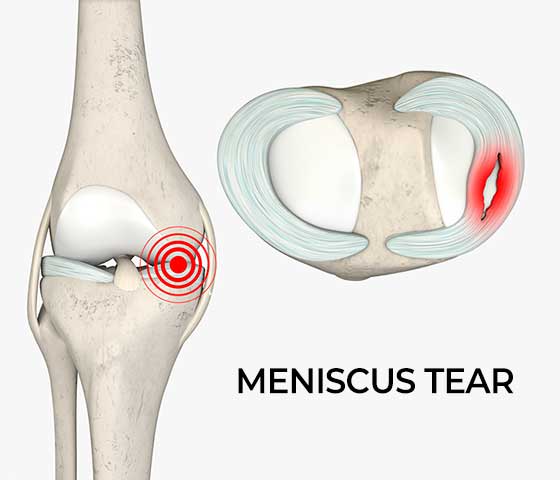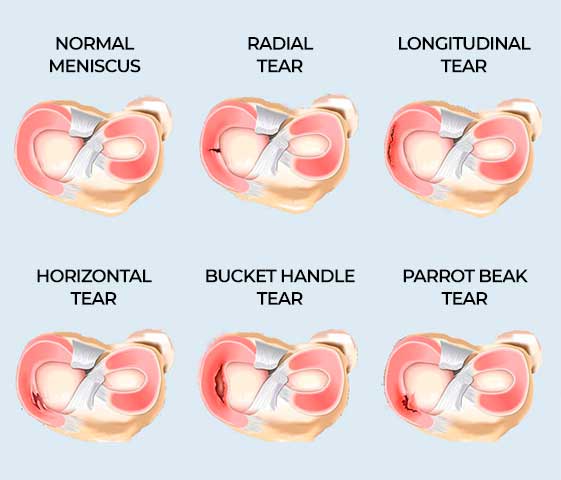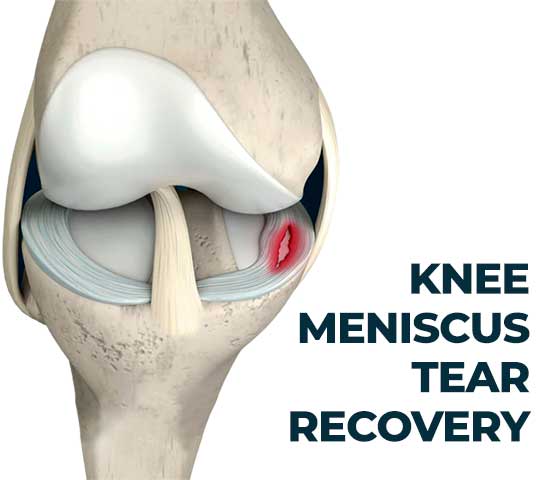A knee meniscus tear is a common injury, especially among athletes, but it can occur to anyone. The menisci are two crescent-shaped pieces of cartilage located between the thigh bone (femur) and the shin bone (tibia). They act as shock absorbers and help stabilize the knee joint.

There is two principal causes of knee meniscus tear: the first is Trauma, often occurs during activities that involve twisting or turning the knee with the foot planted, such as in sports like soccer, basketball, or tennis. The other one is Degeneration. Over time, the menisci can weaken and become more prone to tearing, even from minor movements or injuries. This is more common in older adults.
Physiotherapy plays a crucial role in the recovery from a knee meniscus tear, whether you’ve had surgery or opted for conservative treatment. Meniscus tears are extremely common knee injuries. At Revolve Physiotherapy in Milton, Ontario, our team will provide a proper diagnosis, treatment and rehabilitation. As a result, most patients often return to their pre-injury abilities.
Here some non-surgical recovery treatment procedures:
Initial Phase (1-2 weeks)
- Rest and Pain Management: Focus on reducing pain and swelling with rest, ice, compression, and elevation (RICE).
- Gentle Range of Motion (ROM) Exercises: Start with simple ROM exercises to maintain flexibility and prevent stiffness.
- Isometric Exercises: Strengthening the quadriceps and hamstrings without moving the knee.
Intermediate Phase (2-6 weeks)
- Progressive Strengthening: Introduce more dynamic exercises to strengthen the quadriceps, hamstrings, calves, and hip muscles.
- Balance and Proprioception Exercises: Activities to improve balance and coordination.
- Low-Impact Aerobic Exercises: Such as swimming or using a stationary bike.
Advanced Phase (6-12 weeks)
- Functional Training: Exercises that mimic daily activities and sports-specific movements.
- Agility and Plyometric Exercises: For athletes, introducing agility drills and plyometrics to prepare for return to sports.
- Gradual Return to Activity: Slowly reintroducing regular activities or sports, guided by pain levels and knee stability.
For Post-Surgical Recovery:
Immediate Post-Surgery (0-2 weeks)
- Rest and Protection: Use crutches to minimize weight-bearing as instructed by the surgeon.
- Controlled ROM Exercises: Gentle, passive ROM exercises to prevent stiffness.
- Pain and Swelling Management: RICE method and prescribed medications.
Early Recovery Phase (2-6 weeks)
- Progressive Weight-Bearing: Gradual increase in weight-bearing activities based on surgeon’s recommendations.
- Strengthening Exercises: Begin with isometric exercises, progressing to light resistance exercises.
- Controlled ROM Exercises: Increase range of motion exercises as tolerated.
Intermediate Recovery Phase (6-12 weeks)
- Strength Training: Focus on building strength in the quadriceps, hamstrings, and other supporting muscles.
- Balance and Proprioception: Incorporate exercises to enhance balance and knee stability.
- Low-Impact Aerobics: Activities like stationary biking or swimming.
Advanced Recovery Phase (3-6 months)
- Functional and Sports-Specific Training: Preparing for return to sports or specific activities with tailored exercises.
- Agility and Plyometrics: For those returning to high-impact sports, incorporate agility drills and plyometric exercises.
- Gradual Return to Full Activity: Follow a structured plan to slowly reintroduce activities or sports, under the guidance of a physiotherapist and surgeon.
Recovery depends on the type of treatment. Non-surgical treatments may require several weeks of physiotherapy, while surgical treatments might necessitate a longer recovery period with a more intensive rehabilitation program. Regular physiotherapy sessions and adherence to home exercise programs are essential for recovery.

Every individual’s recovery timeline can vary based on factors such as the extent of the tear, type of surgery, overall health, and adherence to the rehabilitation program. It’s important to follow your healthcare provider’s recommendations closely.
If you suspect a meniscus tear, it’s important to see a physiotherapist for an accurate diagnosis and appropriate treatment plan. Knee Meniscus Tear recovery treatment at Revolve Phisiotherapy. You will meet the best team in Milton. Call us now (905) 864.8181 and talk to one of ours specialist.
